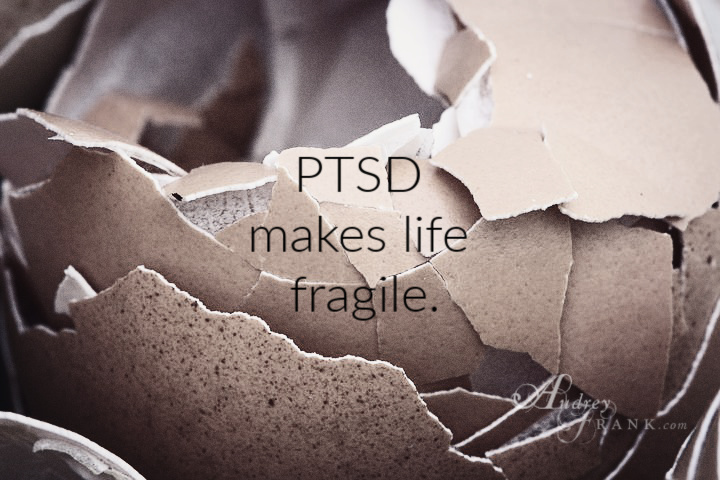Walking on Eggshells: Caring for a Loved One with PTSD
 @audreycfrank
@audreycfrank
To read Part One: When You Are the One Suffering From PTSD, click here.
Part Two: When Your Loved One Suffers From PTSD
When a loved one suffers from Post Traumatic Stress Disorder, life can be very fragile. Some individuals hide the trauma, disappearing deep inside themselves and refusing to talk about it. Others lash out at the people who love them the most. PTSD is unpredictable and painful.
Caregivers can experience secondary effects like shame and guilt, straining relationships to the breaking point, causing confusion, misunderstanding, and more pain.
It may take many years for the one with PTSD to find words to explain to a loved one why he or she withdraws unexpectedly or lashes out in anger and fear.
When you care for someone who is suffering through PTSD, you may sometimes feel that you only add to the pain the survivor feels. You may become confused and deeply concerned, drawing the conclusion that you are hurting, rather than helping.
You may react by searching yourself for blame, trying to figure out what you did wrong. Often you may not even realize it has happened until you see that familiar veil go up in his or her eyes, that distance that you cannot seem to bridge, that coldness where warmth embraced you only moments before. Then you torment yourself, wondering what you did to trigger the pain.
This can be a very difficult place in which to love and persevere. You, as caregiver and friend, need help in understanding this complex and difficult condition. You, too, need support.
[tweet_box design=”default” float=”none”]When your loved one suffers from #PTSD, you do too. Know how to take care of yourself.[/tweet_box]
Confusion and conflict happen to the most concerned and skilled companions of those with PTSD. It cannot be entirely avoided.
Here are some important insights which can help you and your loved one walk through this successfully:
- Educate yourself about Post Traumatic Stress Disorder. Know the facts. See some of the resources cited at the end of this article for more information.
- Do not take the survivor’s anxiety and emotional agony personally. It will feel personal, but it is not.
- Realize that withdrawal is part of PTSD. Let your loved one know you are available but allow space if he or she resists your help.
- Know when to walk away for a time of rest and separation from the intensity. Seek support for yourself and engage in activities that revitalize you.
- Take care of your own health. Eat well and get rest. Get out of the space for a while so you can breathe deeply.
- Practice what the Red Cross calls The Ministry of Presence. Be present, quietly going about quiet tasks, spending time with your loved one without necessarily having to talk. Research shows that those with loved ones present with them are better able to avoid loneliness and isolation, recovering faster.
- Don’t try to fix the person, the problem, or the situation. Listen, listen, listen.
- If your loved one talks of suicide or any thoughts of hurting herself, seek help immediately.
- Be patient. Healing and health come with time.
- Realize that you cannot always protect your loved one from triggers. Walk with her or him as they face them and be available to talk when they need to.
- Pray. It is okay to ask your loved one if you can pray for her or him when you have no idea what to say.
- Offer to attend counseling with your loved one. It can help you gain tools together to walk through PTSD.
- Be safe. Have a safe place you and your family can go if your loved one becomes abusive.
Although it can feel like a thankless job, the work of supporting a loved one through PTSD is a courageous and life-changing gift. Your loved one may appreciate it more than he or she can show you, and despite communication that seems to push you away, your presence in his or her life is greatly needed and often deeply desired.
Learning how to take care of yourself will help you both.
Resources:
http://www.nimh.nih.gov/health/topics/post-traumatic-stress-disorder-ptsd/index.shtml
Scholten, Robert. Psalm Twenty-Five & PTSD: A Journey Into the Darkened Realms of Post Traumatic Stress Disorder.
Waddell, Marshele Carter, and Orr, Kelly K. Wounded Warrior, Wounded Home: Hope and Healing for Families Living with PTSD and TBI.
http://www.focusonthefamily.com/media/daily-broadcast/impact-of-ptsd-on-military-families-pt1
http://www.focusonthefamily.com/media/daily-broadcast/impact-of-ptsd-on-military-families-pt2
http://www.ptsd.va.gov/public/family/ptsd-and-relationships.asp
http://www.helpguide.org/articles/ptsd-trauma/post-traumatic-stress-disorder.htm#family
www.brokenbelievers.com
http://www.aacc.net/2013/07/26/treatments-for-ptsd-what-you-need-to-know/
http://www.crosswalk.com/blogs/jim-daly/things-to-remember-about-ptsd.html

No Comments